|
|
|
Sort Order |
|
|
|
Items / Page
|
|
|
|
|
|
|
| Srl | Item |
| 1 |
ID:
167060
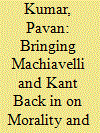

|
|
|
|
|
| Summary/Abstract |
This article is an attempt to understand the idea of morality in two of the most influential philosophers Niccolo Machiavelli (The Prince and Discourses) and Immanuel Kant (Perpetual Peace and Metaphysical Elements of Justice). Machiavelli and Kant are chosen because both of them are the most cherished philosophers in their fields. Machiavelli’s name is associated with realism, and he got a bad name because of his alleged cruel advice to maintain the state. His name is equalled with cunningness, murder, treachery. On the other hand, Kant is the founding figure of idealism in politics. His focus on categorical imperative and human capabilities to attain the higher moral goals made him one of the most well-known philosophers on idealism. To understand the ethical problems of the day emphasis is given to the classic writings of scholars who have written extensively on morality, justice, state, power, human rights and individual freedom. This article is an attempt to answer the following questions: Is the state in itself a highest moral actor? Can there be an individual morality above the state? What should be the yardstick to judge an act—the act in itself or the outcome of the act? What are the duties and rights of the individual in domestic society and can there be a similarity of morality at the level of political leaders in international politics? The paper argues that both Machiavelli and Kant were dealing with different contexts and societies, and morality for them had different meanings. However, the end justifies the means dictum is not the right way to understand Machiavelli on morality.
|
|
|
|
|
|
|
|
|
|
|
|
|
|
|
|
| 2 |
ID:
090374
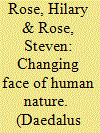

|
|
|
| 3 |
ID:
154121
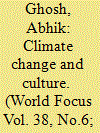

|
|
|
|
|
| Summary/Abstract |
Climate change and its effects have been regularly talked about end detailed by researchers, writers as well as common people of all colours and creeds. Today, many of the basic ideas of climate change have become part of the language and knowledge of the people in the street. Yet, there is often an element that is found to be missing in all the comments and discussions relating to climate change.
|
|
|
|
|
|
|
|
|
|
|
|
|
|
|
|
| 4 |
ID:
154005
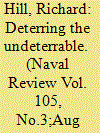

|
|
|
| 5 |
ID:
130823
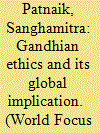

|
|
|
|
|
| Publication |
2014.
|
| Summary/Abstract |
Politics is the most crucial human activity that involves governance. Ethics is the set of principles those regulate the activity of governance and administration. Before we focus on Gandhian Ethics it is necessary to focus on the two schools of thought - Idealism and Realism. Idealism was an approach to international politics based upon liberal assumptions and principles. lt was optimistic as it envisioned a world.in which law, institutions and diplomacy replaced power, competition and use of force. This School was represented 'by St. Simon, Richard Cobden. Aldous Huxley, Russell, Mahatma Gandhi, Wilson and Margaret Mead. It gave emphasis on the role of education and international institutions to bring a better world. It focused on the Positive side of human nature. It proceeded with the assumption that the harmony of the interests was not impossible. Hans J. Morgenthau is the main exponent of realist theory. For him the central focus of realism was power. He de?ned power as "man's control over the minds and actions of other man"(Morgenthau,l993). He emphasized on: lnevitability of conflict among nations, Centrality of Power, Ever -present threat of war.
|
|
|
|
|
|
|
|
|
|
|
|
|
|
|
|
| 6 |
ID:
110847
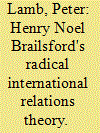

|
|
|
|
|
| Publication |
2011.
|
| Summary/Abstract |
Compared with some of his contemporaries Brailsford is relatively neglected today. He offered incisive analysis of the international relations of his times, discussing political and economic aspects together. He grounded his contributions upon a view of human nature that drew on the ideas of Godwin, Shelley and Condorcet. A cosmopolitan, socialist political philosophy also underpinned his work. Brailsford was sharply critical of balance-of-power theory, which served to veil the actual intentions of statesman and the capitalist entrepreneurs whose policies they benefited. He was also critical, like Laski, of sovereignty theory which masked the dominance of capitalist interests in the modern state and international system. Over several decades these aspects of his work contributed to his proposals for a radical league of nations. His work will be of interest to IR scholars today.
|
|
|
|
|
|
|
|
|
|
|
|
|
|
|
|
| 7 |
ID:
095433
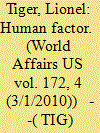

|
|
|
|
|
| Publication |
2010.
|
| Summary/Abstract |
It's hardly surprising that a sentient species such as ours would be attentive to its immediate environment. Nor is the extension of that immediacy to the planet overall difficult to understand: mankind has always been interested in nature for both practical and aesthetic reasons. It follows that the broad effort toward scientific explanation of the impact of people and systems on nature has supported what has become a global environmental movement, at least conceptually. And not only conceptually, because there have been repeated gatherings of concerned leaders intent on responding to current and future problems associated with environmental impact, such as warming trends and sea levels. Perhaps not since the Communist International has there been such a self-conscious and comprehensive effort to accomplish large-scale goals.
|
|
|
|
|
|
|
|
|
|
|
|
|
|
|
|
| 8 |
ID:
090149
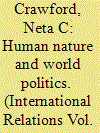

|
|
|
|
|
| Publication |
2009.
|
| Summary/Abstract |
While realists acknowledge that their theories of world politics are rooted in specific assumptions about human nature, neorealists tend to discount human nature in favor of an emphasis on systemic forces. Nevertheless neorealism has assumptions about human nature that shape neorealist theorizing. Specifically, in Man, the State, and War and Theory of International Politics, Waltz make essentially the same assumptions about human nature as the realists - that our human natures are fixed, that we cannot trust others, and that decision-makers are rational calculators who seek to promote their narrowly defined self-interests. Moreover, for Waltz, human nature determines world politics as much or more than its anarchic structure. A review of biology, specifically human neuroscience, suggests that these assumptions about human nature, and its relation to world politics, ought to be challenged. Our `natures' are much more complex and flexible than realism and neorealism assumes.
|
|
|
|
|
|
|
|
|
|
|
|
|
|
|
|
| 9 |
ID:
057732
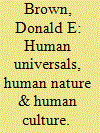

|
|
|
| 10 |
ID:
133943
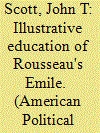

|
|
|
|
|
| Publication |
2014.
|
| Summary/Abstract |
Rousseau's mission as an author was to make his readers see what he saw in his philosophical "illumination," yet his task is a paradoxical one, for he must persuade his readers that they are deceived by what they see before their own eyes and must learn to see anew. In order to transform the perspective of his reader, Rousseau throughout his works uses visual imagery and rhetorical devices invoking vision that represents both the correct view of human nature and virtue and the obstacles to learning to see ourselves properly. As a former engraver's apprentice, he was particularly interested in educating his reader through actual images such as frontispieces or illustrations. The aim of this article is to offer an interpretation of the engravings that illustrate Emile, or On Education, in order to investigate how Rousseau educates his reader through challenging the reader's preconceptions concerning human nature and replacing traditional exemplars of human nature and virtue with a new exemplar seen in his imaginary pupil.
|
|
|
|
|
|
|
|
|
|
|
|
|
|
|
|
| 11 |
ID:
090377
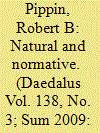

|
|
|
| 12 |
ID:
082743
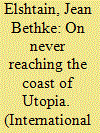

|
|
|
|
|
| Publication |
2008.
|
| Summary/Abstract |
Elshtain argues that the realist-idealist divide serves no useful heuristic or even polemical purpose. Beginning with Tom Stoppard's acclaimed trilogy, The Coast of Utopia, Elshtain unpacks utopian arguments of recent vintage, showing their distinctive features. She goes on to display the utopistic/idealist `moments' in the work of self-described `realist' E. H. Carr as part of a critical re-examination of Carr's work. The article continues with an appreciative assessment of Martin Wight, concluding that his `idealism' is far more `realistic' than are the arguments of many `realists'. The article's concluding section makes the case for Augustinian realism
|
|
|
|
|
|
|
|
|
|
|
|
|
|
|
|
| 13 |
ID:
096578
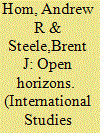

|
|
|
| 14 |
ID:
160054
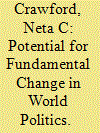

|
|
|
|
|
| Summary/Abstract |
Despite the Realist’s assertion that nothing fundamental changes in world politics, change is the norm in all life and all fields. World politics is no exception. Yes, there are continuities in world politics; they are the persistent, albeit themselves changing, mechanisms that foster fundamental change, the both large and small alterations in the nature of agents, structures, processes, and the content of arguments. Sometimes things change slowly, they evolve. And sometimes radical changes occur in a relatively short period of time; we might think of the latter as phase changes or radical ruptures at tipping points. But often those ruptures have been preceded by decades of slower work by advocates of change toiling in civil societies or specialized communities. Thus, a great deal of effort goes into not only making change but also resisting change.
|
|
|
|
|
|
|
|
|
|
|
|
|
|
|
|
| 15 |
ID:
047400
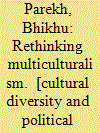

|
|
|
|
|
| Publication |
London, macmillan Press, 2000.
|
| Description |
xii, 379p.
|
| Standard Number |
033360881X
|
|
|
|
|
|
|
|
|
|
|
|
Copies: C:1/I:0,R:0,Q:0
Circulation
| Accession# | Call# | Current Location | Status | Policy | Location |
| 043311 | 306.446/PAR 043311 | Main | On Shelf | General | |
|
|
|
|
| 16 |
ID:
090147
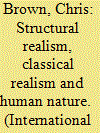

|
|
|
|
|
| Publication |
2009.
|
| Summary/Abstract |
Kenneth Waltz's Theory of International Politics is a modern classic, and deserves to be read the way classic texts ought to be read, i.e. in context and in its own terms. Recovering the context in this case is difficult because of the changes in the discourse since 1979, but one difference between the contemporary and the current reception of the text does seem clear - Waltzian structural realism (or neorealism) is now, but was not then, seen as breaking with the traditions of classical realism. How is this discontinuity to be understood? Part of the answer lies in the rhetoric employed by participants in this debate, but, more substantively, there is a genuine disagreement between neorealism and classical realism over the role played by human nature in international relations. Waltzian neorealism appears, contrary to the tradition, to reject any major role for human nature, describing theories that emphasise this notion as `reductionist'; however, on closer examination, the picture is less clear-cut. Waltz's account of human nature can be related quite closely to the major strands in the realist genealogy, but at a tangent to them. Interestingly, and perhaps unexpectedly, it is also compatible with at least some of the findings of contemporary evolutionary psychology.
|
|
|
|
|
|
|
|
|
|
|
|
|
|
|
|
| 17 |
ID:
090150
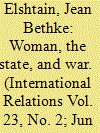

|
|
|
|
|
| Publication |
2009.
|
| Summary/Abstract |
Does `gender' as a category of analysis or as a central feature of a logic of explanation alter in significant ways Kenneth Waltz's famous `levels of analysis' as developed in his classic, Man, the State, and War? One overriding claim of feminist international relations has been that `gender' alters all levels of analysis; thus, changing `man' to `woman' in the formulation `man, the state, and war' significantly transforms our understanding of international relations. I evaluate this claim critically by assessing the adequacy of feminist formulations on each of Waltz's levels of analysis and, further, by unpacking Waltz's own understanding of these levels. I conclude that Waltz remains enormously helpful in deconstructing reductionist accounts, especially on the `first level' of analysis, but that his own account is problematic insofar as it insists on a `structural analysis' sundered from his levels 1 and 2, namely, wars flow from human nature or, alternatively, from the domestic ordering of states. I point out that Waltz himself leaves some `wiggle room' in his book that permits one to `plug in' features of the first two levels of analysis that are critical to understanding the structural level. In other words, all three levels must be in play if one is to craft a compelling explanatory framework.
|
|
|
|
|
|
|
|
|
|
|
|
|
|
|
|
|
|
|
|
|